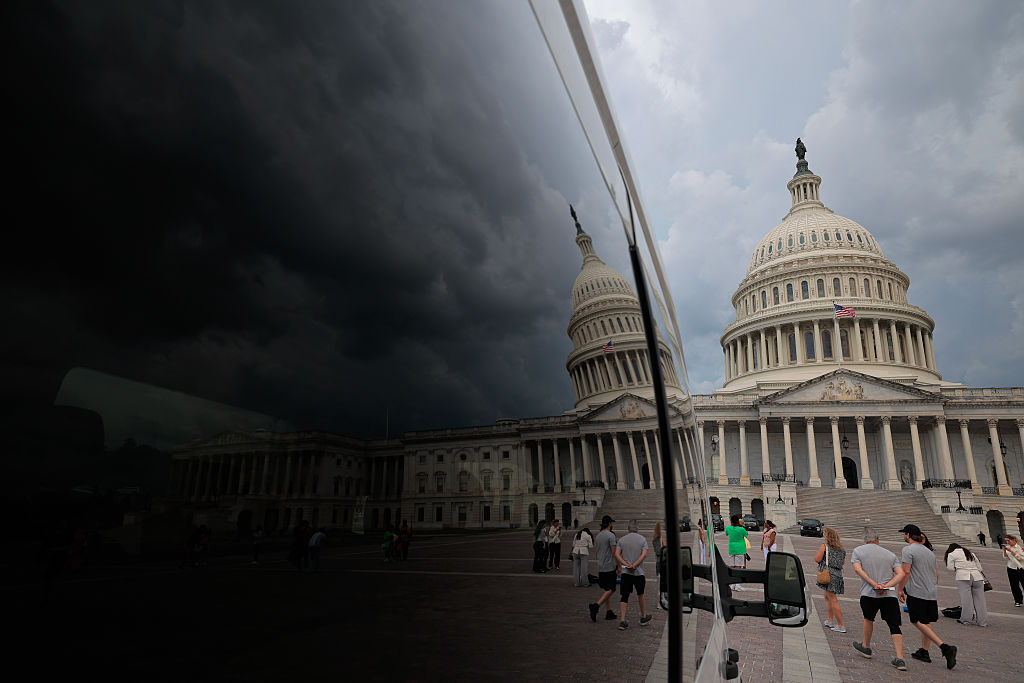The Republican-controlled Congress on Wednesday could pass a sweeping budget package that would fulfill many of President Donald Trump’s priorities. It has already passed the Senate and needs to be approved again by the House of Representatives before Trump can sign it into law.
Here is a summary of the major elements of the package, with cost and savings estimates by the Congressional Budget Office or the Joint Committee on Taxation when available.
CBO estimates the bill would add $3.3 trillion to the $36.2-trillion debt over 10 years, reduce revenues by $4.5 trillion and cut spending by $1.2 trillion. The number of people without health insurance would increase by 10.9 million over that period due to changes to programs such as Medicaid.
INDIVIDUAL TAX CUTS
-
Makes permanent the lower income tax rates in Trump’s 2017 Tax Cuts and Jobs Act that are currently due to expire at the end of 2025 (Cost: $2.2 trillion)
-
Extends the standard deduction. (Cost: $1.4 trillion)
-
Extends and expands the alternative minimum tax exemption. (Cost: $1.4 trillion)
-
Expands the Child Tax Credit to $2,200 and indexes to inflation. (Cost: $817 billion)
-
Raises the estate tax exemption to $15 million. (Cost: $212 billion)
-
Exempts taxes on overtime pay until 2029. (Cost: $90 billion)
-
Exempts taxes on some tipped income until 2029. (Cost: $32 billion)
-
Creates a new deduction of up to $6,000 for people age 65 and older until 2029
-
Creates a tax break for some interest payments on auto loans until 2029. (Cost: $31 billion)
-
New tax-advantaged savings accounts for newborns. (Cost: $15 billion)
-
Expands deduction for state and local tax (SALT) payments from $10,000 to $40,000 until 2029
-
Exempts up to $1,700 for contributions to scholarship funds for private schools (Cost: $26 billion)
BUSINESS TAX BREAKS
-
Extends and increases a tax break for owners of “pass-through” businesses, such as sole proprietorships and LLCs (Cost: $737 billion)
-
Full expensing for business equipment purchases (Cost: $363 billion)
-
Full expensing of business research and development costs (Cost: $141 billion)
-
Expands tax break for business interest expenses (Cost: $61 billion)
OTHER TAX CHANGES
-
Raises taxes on the biggest private university endowments from 1.4% to 21% (New revenue: $761 million)
-
Imposes a new 1% tax on funds sent by immigrants to their home countries (New revenue: $10 billion)
-
Eliminates taxes on firearm silencers (Cost: $1.7 billion)
-
Gives the government power to strip tax exempt status from organizations found to be “terrorist supporting”
MEDICAID AND OTHER HEALTH PROGRAMS
Total savings: $1.1 trillion
-
Requires able-bodied adults who have no dependents to work, volunteer or be in school at least 80 hours a month starting in 2027
-
Bolsters eligibility verification measures for participants and healthcare providers and removes rules that make it easier to enroll
-
Excludes some non-citizens from the program and penalizes states that use their own funds to provide coverage to them
-
Blocks regulations that required minimum staffing levels at nursing homes and other long-term care facilities
-
Prohibits funding for gender transition therapies for minors
-
Prohibits payments to large providers like Planned Parenthood that specialize in birth control, abortion and other reproductive health services
-
Limits state “provider taxes” that are used to raise the federal government’s contribution
-
Adds $50 billion to rural providers to help offset the loss of revenue from the provider-tax limitation
-
Imposes stricter eligibility requirements for Affordable Care Act exchange insurance coverage
ENERGY, ENVIRONMENT, COMMUNICATIONS
-
Repeals grant programs for purchasing electric heavy-duty vehicles
-
Repeals grants to reduce air pollution, greenhouse gas emissions
-
Creates incentives for pipelines, natural gas exports and exploration
-
Ends tax breaks for electric vehicles
-
Ends tax breaks for clean electricity and green energy
-
Restricts incentives for nuclear power
-
Cancels funding for green-energy grant programs in the 2022 Inflation Reduction Act, including vehicle manufacturing, home efficiency upgrades, electricity transmission and wind power
-
Weakens enforcement of fuel-efficiency standards for automobiles and pickup trucks
-
Makes more electromagnetic communication spectrum bands available for auction
IMMIGRATION AND JUSTICE
Total cost: $178 billion
-
Provides money for border wall construction
-
Funds surveillance towers, drones and other border-security equipment
-
Increases staffing for immigration enforcement, border control and immigration courts
-
Increases detention capacity for immigration enforcement
-
Increases law enforcement protection of the president
-
Adds funding to investigate visa fraud and other immigration-related crimes
-
Imposes new fees of up to $5,000 for immigrants’ work permits, court hearings, applications for asylum and other matters
-
Reimburses states for border-security costs
-
Allows courts to require plaintiffs to post a bond when they sue to block government policies
MILITARY
Total cost: $153 billion
-
Increases spending on shipbuilding
-
Adds funds for air and missile defense
-
Pays for munitions, nuclear weapons
-
Funds military operations to assist with border security
FOOD ASSISTANCE
Total savings: $186 billion
-
Increases work requirements for some of the 41 million participants in the SNAP food aid program
-
Shift some costs from federal government to states
-
Bars some noncitizens from benefits
EDUCATION
-
Changes student loan repayment plans (Savings: $287 billion)
-
Imposes borrowing limits for some student loan programs (Savings: $51 billion)
-
Limits the government’s ability to cancel student debt (Savings: $18 billion)
(Reuters)














